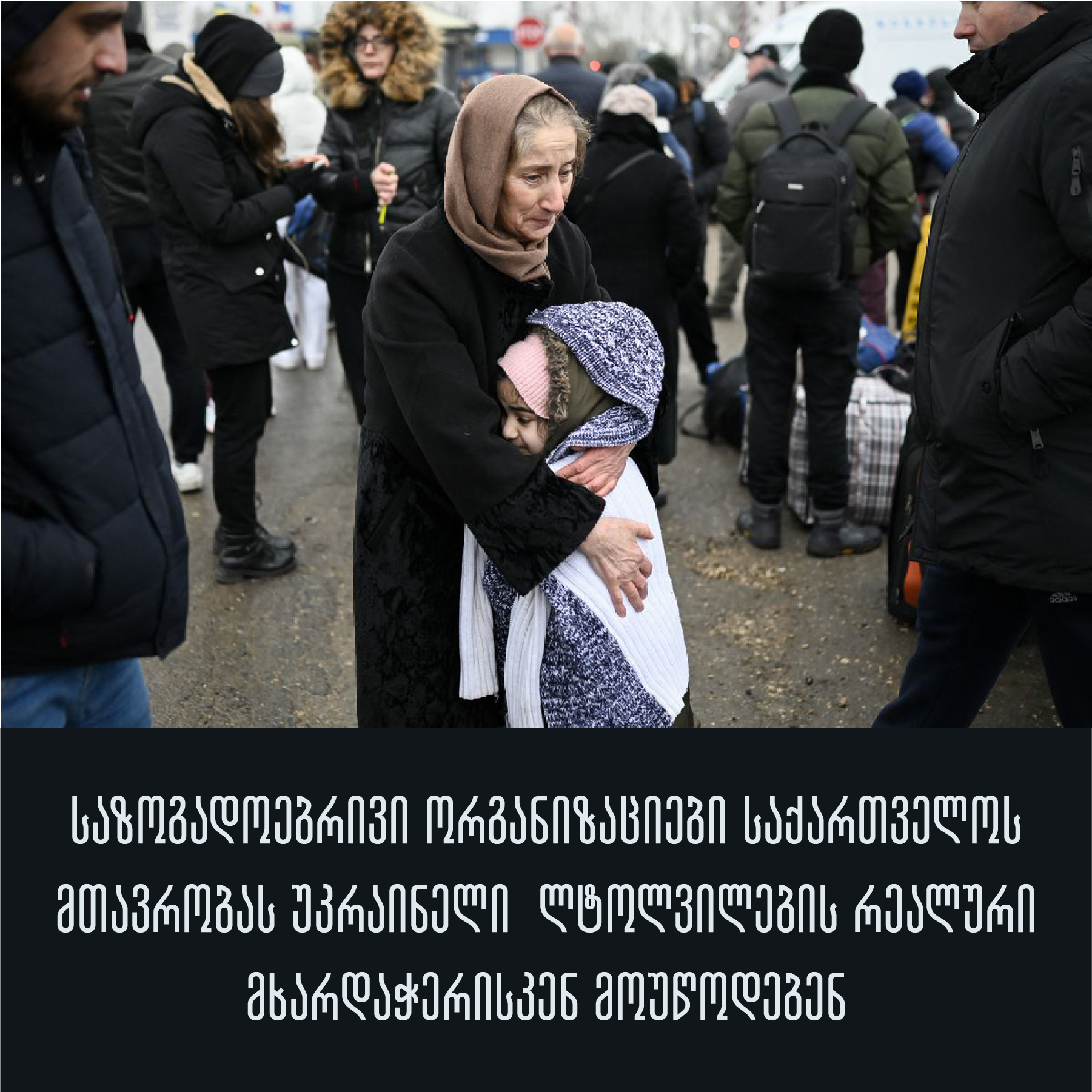საერთო ცხელი ხაზი +995 577 07 05 63


The signatory organizations call on the Georgian authorities to instigate a comprehensive policy to ensure organized reception of refugees from Ukraine and bona fide support of refugees already in Georgia.
For more than two weeks, the military aggression of the Russian Federation, the gross violations of international and humanitarian law have taken the lives of the civilian population of Ukraine, the number of children killed has exceeded 50, some Ukrainian cities (Mariupol, Kharkiv, Melitopol, etc.) are facing a humanitarian crisis. The International Committee of the Red Cross delineates the state of affairs in Mariupol as "apocalyptic" - people are left without water, food, or heating. The number of refugees in Europe has exceeded two million and the surge of refugees does not stop in Poland, Hungary, Slovakia, Romania, Moldova, and other destinations. Many women and children are still trying to escape Russia's brutal military aggression. EU member states offer simplified, bureaucracy-free, and responsive social assistance (employment, education, medical and humanitarian assistance) programs to Ukrainian refugees who have fled the country after the war.
The trend of Ukrainian refugees entering Georgia may also be discerned. According to our observations, after the start of the war, asylum seekers in Georgia are mainly those Ukrainians who have relatives, family, or other strong ties with Georgia. Despite this reality, it is clear that the Georgian authorities have not taken proactive steps to organize the evacuation of refugees from Ukraine and to provide them with proper and real support in Georgia. Moreover, thousands of Ukrainian tourists, who were unable to return to Ukraine due to the war that started on February 24, 2022, remain in Georgia, and they also face the need for urgent social support.
There is no official information on the total number of Ukrainian refugees in Georgia so far, as the state does not have a proactive system for their registration and provision of legal support. It appears that due to the fact that Georgia has a visa-free regime with Ukraine and Ukrainian citizens have the right to enter Georgia and stay for a full 1 year without a visa, the Georgian government is not trying to register these persons in time and grant them appropriate legal status. The initiation of the process of temporary protection or granting refugee legal status is a precondition for granting social and other support, and the inaction in this regard will have a severe impact on the social status of refugees.
The Georgian authorities have provided some initial support to Ukrainian (and other) tourists visiting Georgia before February 24, who have been unable to return to their homeland due to the war. There is a special hotline for this group and they are offered residential, social, and other support. However, it is surprising to us that there is neither a hotline nor special programs for the refugees who entered Georgia after the war, which would provide immediate and adequate support to the families and people affected by the war in this difficult reality. The lack of a systematic policy of support for Ukrainian refugees in Georgia is becoming even more troubling amid the sharply problematic and unacceptable statements and decisions made by the Georgian Government on the issue of war in Ukraine started by Russia.
Our observation of the situation of Ukrainian refugees entering Georgia shows that the Georgian government fails to have a policy aimed at meeting their housing, psycho-social, medical, and other needs, and self-organized civic groups are the ones trying to provide initial support to refugees fleeing war. Individual commercial organizations and private persons are devoting their space to refugees, although it is clear that this process will not last long (especially in light of the start of tourist season) and it is essential that the state ensures timely accommodation of refugees and the provision of adequate living conditions. Based on the interviews with Ukrainian refugees, we can say that the issue of creating pre-school and general education opportunities for children is especially acute for families who have moved to Georgia. In the light of the trauma of war, it is essential for the state to have psycho-medical rehabilitation and support programs for refugees.
We believe that Georgia, which has suffered Russian military aggression and heavy war-related losses, should be one of the first countries to offer real support to a friendly country today, including in the form of receiving refugees. It is critical that the government develops refugee reception policies and provides suitable housing, education, humanitarian, psycho-medical, and social assistance until they are able to safely return to their homeland.
Given the above, we, the signatory organizations, call on the Georgian authorities:
Signatory organizations:
The website accessibility instruction